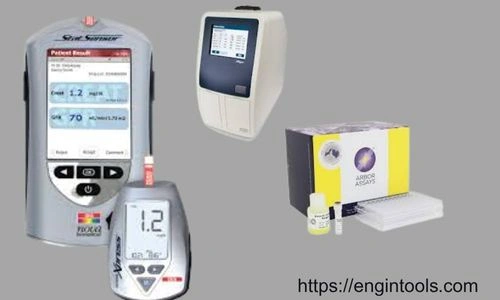What is a Creatinine Sensor?
A Creatinine sensor is a medical device designed to measure the concentration of creatinine in biological fluids, primarily blood or urine. Creatinine is a waste product generated from muscle metabolism, and its levels are indicative of kidney function.

Monitoring creatinine levels is crucial in diagnosing and managing various renal conditions, as well as in assessing overall health.
How Does a Creatinine Sensor Work?
Creatinine sensors typically operate based on electrochemical detection methods or colorimetric assays. Here’s how they generally function:
1.Sample Collection: A small sample of blood or urine is obtained from the patient.
2.Chemical Reaction: In the case of colorimetric sensors, creatinine in the sample reacts with specific reagents, resulting in a color change proportional to the creatinine concentration. In electrochemical sensors, creatinine is oxidized at an electrode, producing an electrical signal.
3.Signal Processing: The sensor converts the chemical reaction or electrical signal into a quantifiable measurement. This often involves calibration with known standards to ensure accuracy.
4.Output Display: The sensor displays the creatinine concentration, typically in milligrams per deciliter (mg/dL) for blood or milligrams per liter (mg/L) for urine.
Types of Creatinine Sensors
There are several types of creatinine sensors, each utilizing different technologies:
1.Colorimetric Sensors: These sensors utilize colorimetric assays to determine creatinine concentration based on light absorption.
2.Electrochemical Sensors: These sensors measure electrical signals generated during the oxidation of creatinine.
3.Spectrophotometric Sensors: These devices measure the intensity of light at specific wavelengths to determine creatinine levels.
4.Enzymatic Sensors: These sensors use specific enzymes that react with creatinine to produce measurable by-products.
5.Portable Handheld Sensors: Compact devices designed for quick and easy measurements in clinical and home settings.
Applications of Creatinine Sensors
Creatinine sensors are employed in various applications, including:
1.Kidney Function Monitoring: Assessing renal health in patients with chronic kidney disease (CKD) or acute kidney injury (AKI).
2.Drug Dosage Adjustment: Monitoring creatinine levels to tailor medication dosages in patients with renal impairment.
3.Health Screening: Screening for kidney disorders in routine health check-ups.
4.Research and Clinical Trials: Collecting data on renal function in clinical studies.
5.Sports Medicine: Monitoring athletes’ renal health during intensive training.
Top Seven Highly-Rated Creatinine Sensors:
Creatinine sensors are essential for assessing kidney function by measuring creatinine levels in blood or urine. Here are some highly-rated creatinine sensors:
1: StatSensor Creatinine Meter
A handheld analyzer that provides rapid, accurate creatinine and eGFR results in 30 seconds using a 1.2 µL fingerstick capillary blood sample.
2: Allegro Point-of-Care Analyzer
A compact, portable analyzer capable of measuring creatinine levels along with other analytes, offering results in 6 seconds to 10 minutes.
3: Serum Creatinine Detection Kit by Arbor Assays
A kit designed for the precise quantitative measurement of creatinine levels in serum and plasma, providing results within 30 minutes.
4: QuantiChrom™ Creatinine Assay Kit by BioAssay Systems
An assay kit that measures creatinine directly in biological samples without any pretreatment.
5: Creatinine Assay Kit by Abcam
An assay kit providing an accurate, convenient measure of creatinine concentration in biological fluids such as serum, urine, or cerebrospinal fluid.
6: Creatinine Clearance Meter by Chourishi Systems
An app designed to calculate creatinine clearance, which is a measure of the glomerular filtration rate (GFR).
7: Creatinine Sensor by Zimmer & Peacock
An electrochemical sensor designed for measuring creatinine levels in blood, compatible with Zimmer & Peacock’s SIA platform.
Please note that availability and purchasing options may vary based on your location. It’s advisable to contact the manufacturers or authorized distributors directly for purchasing information.
Conclusion
Creatinine sensors play a vital role in monitoring kidney health and diagnosing renal disorders. With various types available and many brands competing for market share, healthcare professionals and patients have access to a wide range of options for accurate creatinine measurement. Always consult with a healthcare provider for the most appropriate tools for individual needs.
Explore More Sensor Technologies
If you’re interested in cutting-edge sensor innovations, don’t miss these curated guides:
- Top 10 Capacitive Sensors: Revolutionizing Touch and Proximity Detection
Discover the most advanced capacitive sensors used in modern electronics, automation, and wearable tech. - Top Five Bilirubin Sensors for Biomedical Applications
Explore high-precision bilirubin sensors that are transforming neonatal and liver health diagnostics. - Top 10 Protein Sensors for Biochemical Analysis
Dive into the world of protein detection with these sensors used in medical, food, and research industries. - Top 10 pH Sensors for Accurate Chemical Monitoring
Uncover the best pH sensors used in laboratories, industrial systems, and environmental monitoring. - Top Six Hemoglobin Sensors Improving Blood Analysis
Learn about the latest hemoglobin sensing technologies that support advanced health monitoring and diagnostics.
